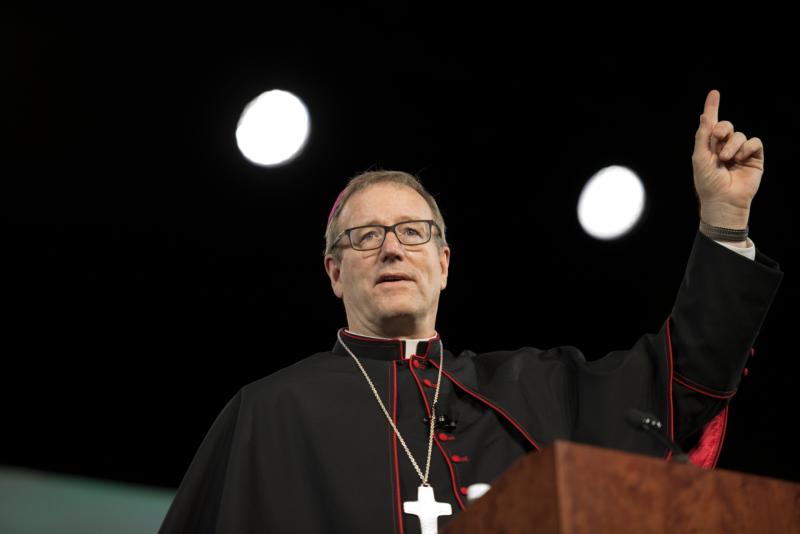
By Christopher White, The Tablet’s National Correspondent
LOS ANGELES, Calif. – While Google may have defined the modern-day search engine, Bishop Robert Barron, known as one of America’s premier Catholic preachers and teachers, believes that today’s search for meaning is inextricably tied to religion as much as technology.
In a speech on “Religion and the Opening Up of the Mind,” delivered on Tuesday at Googleplex, the main headquarters of the tech industry giant, Bishop Barron said there’s an explicit connection between the modern world’s constant quest for immediate answers and the question of God.
“Whatever our minds, if not our hearts, desire is readily available for our consumption,” said Bishop Barron. “This moment in our civilizational development has an intriguing connection to religion.”
Humans naturally want to ask questions and seek answers – sometimes stubbornly so – observed Bishop Barron, and that’s why he believes that whether it be through search engines or through religion, there’s a correlation “to the restlessness of the intellectus agens,” or the active or searching mind.
Drawing on St. Thomas Aquinas, the 13th-century Dominican philosopher and theologian, the bishop said it’s for this very reason he believes the most serious objections to both secularism and atheism is that they both shut down the mind’s active quest for knowledge.
“Though skeptics and atheists, both old and new, tend to wrap themselves in the mantle of reason, I fear that they are, in point of fact, enemies of reason, precisely in the measure that they drop or rule out of court the most interesting questions,” he posited.
Opening the Mind, Liberating the Spirit
“Religion at its best always represents the opening up of the mind, the liberation of the spirit, the full engagement of the intellectus agens,” he said.
In an industry dominated by towering individuals known for revolutionary ideas, including the likes of Steve Jobs, Larry Page, Mark Zuckerberg, and Sheryl Sandberg, Bishop Barron pointed to Aquinas as an original innovator, of sorts, who helped the world make sense of the deepest desires and eternal questions in a systematic manner.
“Ultimately, Thomas Aquinas argues, all human agents – saints and sinners, the compassionate and the wicked – are motivated by a desire for, call it what you want, joy, peace, beatitudo,” Bishop Barron told the crowd at Google on Tuesday.
Quest for Ultimate Good
The beatitudo, he said, is that quest for the ultimate good that satisfies the human appetite.
“Neither wealth, nor pleasure, nor power, nor honor is, in point of fact, the final cause of the will’s activity,” he said. “Human experience reveals clearly that the attainment of even the greatest worldly goods leaves us still wanting more, still unsatisfied.”
In seeking out earthly desires, Bishop Barron said that hunger eventually pushes one beyond the world – borrowing from Aquinas – in search of something to be found “not in any creature, but in God alone.”
“God is love. God is self-diffusive gift,” he continued. “Therefore, to be filled with God is to be filled with love, which is to say, the willingness to empty oneself for the sake of the other. And so the paradox: happiness is never a function of filling oneself up; it is a function of giving oneself away.”
Bishop Barron, who is an auxiliary bishop in the archdiocese of Los Angeles and founder of Word on Fire Ministries, a media apostolate that seeks to use media to bring people back into the faith, was an early proponent within the U.S. Church for using technology as a modern form of evangelization.
In recent years, he has been widely embraced by Silicon Valley and giants within the tech industry. This past September, he delivered a major address at Facebook’s headquarters on how social media has been used to argue about religion.
Avoiding False Idols
While he has been a strong advocate of the many virtues and benefits of new media, he has also cautioned that it can become an idol into itself, an argument he made once more on Tuesday while at Google.
As he completed his remarks, he returned to one of the most famous lines in the entire cannon of Christian classics – Augustine of Hippo’s admission from his Confessions that, “Lord, you have made us for yourself; therefore our heart is restless until it rests in thee.”
“Everything else in the psychological and spiritual life is essentially a footnote to that statement,” Bishop Barron concluded.
